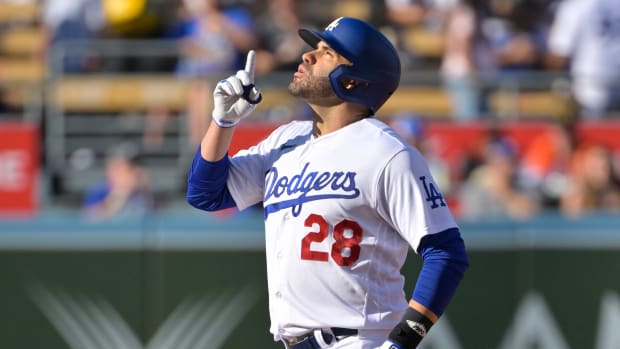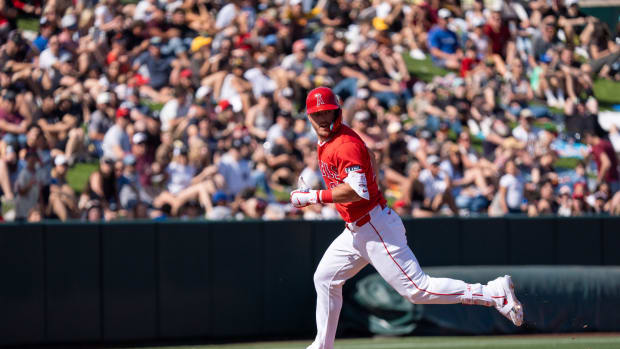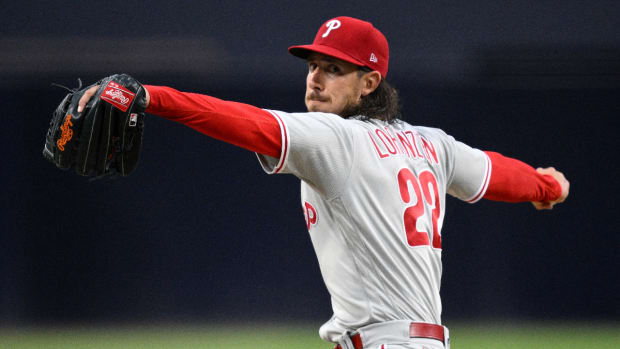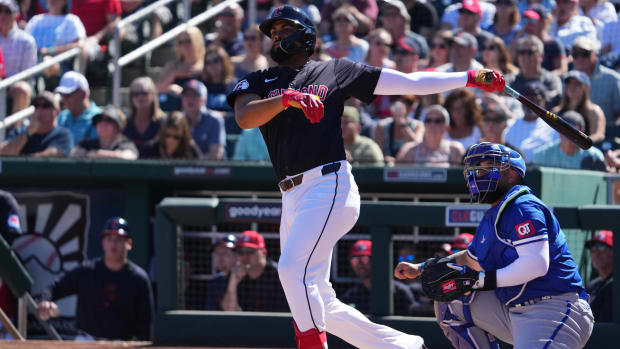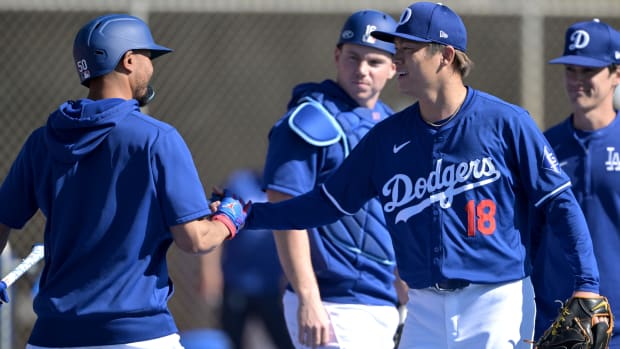The All-Stars' All-Stars: The best players in Midsummer Classic history
On Tuesday night, Mike Trout became the first player ever to be named the the All-Star Game’s Most Valuable Player in consecutive years and just the fifth to win the award twice over any span of time, joining Willie Mays (1963 and ’68), Steve Garvey (1974 and ’78), Gary Carter (1981 and ’84) and Cal Ripken Jr. (1991 and 2001). However, the All-Star Game had no official MVP until 1962, meaning 31 would-be MVPs went un-honored.
With that in mind, here are the top performers in All-Star Game history—the All-Stars’ All-Stars, if you will. Trout has gone 5-for-10 with two doubles, a triple, last night’s homer, a stolen base and two walks against no strikeouts (.500/.583/1.200) in four All-Star Games, but he does not make the list only because of his relatively limited playing time. Every hitter below had at least 26 All-Star plate appearances; Trout has had just 12, but this is yet another list of all-time greats that he is threatening to crack.
1B: Steve Garvey: .393/.433/.821 (30 PA)
An All-Star in eight consecutive seasons for the Dodgers from 1974 to '81 and (less deserved) then for the Padres in '84 and ’85, Garvey thrived on the national stage. In his 10 All-Star games, nine of which he started, Garvey hit .393/.433/.821 in 30 plate appearances and became just the second player to win the game’s MVP award twice.
Garvey won his first MVP in his first All-Star Game, in 1974. He was elected a starter despite being a write-in candidate, the last such player to do so, and he played the entire game, going 2-for-4 with a double in the National League's victory. His second MVP came in 1978, when he again played the entire game and went 2-for-3 with a walk, a two-run single in the third and a leadoff triple off future Hall of Famer Goose Gossage in the bottom of the eighth that helped break a 3-3 tie in a four-run inning. Garvey’s .821 slugging percentage in All-Star competition is the highest for any batter with more than 22 plate appearances, and his 1.254 OPS is just one point behind the leader in that group.
2B: Charlie Gehringer: .500/.655/.600 (29 PA)
Tigers great Gehringer was the AL’s starting second baseman in the first six All-Star Games, from 1933-38, and he still holds the game's all-time records for career batting average (minimum 12 plate appearances) and on-base percentage (minimum eight PA). Gehringer actually went hitless in the first game but walked twice and stole a base, then went 9-for-14 with six more walks in the next four games. He capped his All-Star career with a single and a walk in the 1938 contest. Only two of his hits were for extra bases, but in 29 plate appearances, he collected 10 hits and nine walks and didn’t strike out once. Had the All-Star Game existed prior to his age-30 season, he likely would have participated in another four to six Midsummer Classics.
SS: Derek Jeter: .481/.517/.667 (29 PA)
Famously the only player ever to win the All-Star Game and World Series MVP awards in the same season (2000), Jeter’s excellent career line is largely due to going 3-for-3 in each of his first two All-Star starts in '00 and '04 and 2-for-2 in his last year. That performance in '14 would rank third on this list of Jeter’s most memorable All-Star games. In total, he made the AL team 14 times, appeared in 13 games (missing '11 due to injury) and started nine of them. As for two-time MVP Ripken, he hit .265/.308/.449 in 52 career All-Star plate appearances.
3B: Ken Boyer: .348/.423/.609 (26 PA)
Boyer, Jeter and Garvey are the only position players on this team who are not in the Hall of Fame (or, in Jeter's case, a slam-dunk–first-ballot candidate), and there’s a good argument that Boyer, a five-time Gold Glover and seven-time All-Star, should have gone in as a Veterans Committee pick by now. He started at third base for the NL six times, with two of those coming in 1962, the last of four seasons in which MLB held two All-Star Games (done in order to raise money for an MLB player pension fund). His bookends are what put him on this list. In his first All-Star Game in '56, he started and went 3-for-5. In his last in '64, he started and went 2-for-4 with a home run. Had there been an MVP award at the time, he might have won it for the former performance.
C: Johnny Bench: .357/.400/.679 (30 PA)
Rose dominates headlines at All-Star Game, though not much has changed
An All-Star every year from 1968 to '80 and something of an honorary selection in his final season in '83, Bench started behind the plate for the NL every year from '69 to '77 and in '80 as well, his final season as a full-time catcher. Bench only appeared in the field in ’68, but in ’69 he went 2-for-3 with a home run and a walk; after an 0-fer in '70, he hit safely in his next six All-Star Games, adding home runs in '71 and ’73.
Two-time MVP Gary Carter is a close second here, having hit .300/.364/.750 in 22 career All-Star plate appearances and tying Bench with three home runs, the most by a catcher in All-Star action.
RF: Dave Winfield: .361/.395/.556 (38 PA)
Maybe George Steinbrenner should have called him “Mr. July.” Winfield made his first All-Star appearance as a Padre at Yankee Stadium in 1977, beginning a streak of 12 straight All-Star appearances, the final eight of which came after he joined Steinbrenner's Yankees before the 1981 season. He started in centerfield for the NL in '79 and the AL in '81 and in an outfield corner every year from '83 to '88. He never hit an All-Star home run, but his seven doubles are an All-Star record by a mile, with nine men tied for second at three. Winfield got a hit in each of his final seven All-Star games, but his best showing came in '83, when he went 3-for-3 with a double and an RBI and two runs scored. A close runner up was that first game in '77, when he went 2-for-2 with a double and two RBIs.

Ted Williams, Stan Musial and Willie Mays (L to R) were as good at the Midsummer Classic as they were during the regular season.
Bettman Corbis
CF: Willie Mays: .307/.366/.533 (82 PA)
Willie Mays is the dean of the All-Star Game. Thanks in part to MLB doubling up on the game for four years in his prime, Mays compiled more All-Star plate appearances and at-bats than any other player in the game’s history. And while Hank Aaron made one more All-Star team (25 to Mays’s 24), Mays started one more game (a record 18 to Aaron’s 17), with all of those coming in centerfield for the NL. Mays also owns the career All-Star records for hits (23), stolen bases (six in seven attempts), triples (three, tied with Brooks Robinson) and runs, scoring 20 to Stan Musial’s second-place total of 11. Mays won the game’s MVP award in 1963—when he twice singled, stole second and scored and later drove in another run in a 5–3 NL win—and '68, when he led off the bottom of the first with a single and came around to score the game’s only run. However his best performances were in the two games in 1960, in which he went 6-for-8 with a double, a triple, a home run and a stolen base, going 3-for-4 in each game.
Honorable mention here goes to Fred Lynn, who was an All-Star every year from 1975 to '83, started in centerfield for the AL seven times over that span and hit .300/.364/.900 with four home runs, tied with Ted Williams for the second most in All-Star history. He also hit the only grand slam ever at the Midsummer Classic, which was his final All-Star hit in '83. Lynn’s slugging percentage and 1.264 OPS are the highest marks in the game's history for a batter with at least 15 plate appearances.
LF: Ted Williams: .304/.439/.652 (57 PA)
Having played in just one World Series, Williams famously treated the All-Star Game like his postseason. He made the team every year from 1940 to '60 except for the ones he missed due to his service in World War II and the Korean War, starting in leftfield for the AL 12 times. In 1941, his second game and start, he hit the first walk-off home run in All-Star play (there have been only two more since). Batting with men on the corners, two outs and the AL trailing 5–4 at Detroit’s Briggs Stadium, Williams hit a three-run game-winner off the Cubs’ Claude Passeau that remains arguably the biggest hit in All-Star Game history. Going 2-for-4 with a homer and four RBIs that day, Williams easily would have been the game’s MVP if the award existed then, and he would have won it easily again in '46, when he went 4-for-6 with a walk, two home runs, five RBIs and four runs scored in the AL’s 12–0 trouncing of the Senior Circuit at his home field of Fenway Park.
After those two performances, Williams’s most famous All-Star moment came in 1950, when he broke his elbow making a catch against the wall on a Ralph Kiner drive in the first inning, an injury that would cost him the first 55 games of that season's second half. Nonetheless, he ranks second all-time in All-Star home runs with four, first in RBIs (12) and walks (11) and third in runs scored (10).
DH: Stan Musial: .317/.394/.635 (72 PA)
Angels OF Mike Trout adds to legacy with another landmark performance
The second walk-off home run in All-Star history was Musial’s solo shot off Boston’s Frank Sullivan in the bottom of the 12th inning in 1955. For Musial, who joins Aaron and Mays as one of just three men to appear in 24 All-Star games, that was the fourth of his record six All-Star game home runs, and though it was his only hit of the game, it likely would have been enough to earn him MVP honors.
As large a role as Musial played in All-Star game history, however, he fits best on this team as the designated hitter because of his lack of a consistent position. Musial started 14 All-Star games, 10 of them in the outfield and four at first base, but during his regular-season career, he played more games at first than any single outfield position. Of his 10 outfield starts in the Midsummer Classic, five came in left, three in center and two in right.
RHP: Mel Harder: 0.00 ERA (13 IP)
Cleveland stalwart Harder, who made four straight All-Star teams from 1934 to '37, holds the All-Star record for most innings pitched without allowing a run. Given that his 13 innings pitched are just 6 1/3 fewer than Don Drysdale’s record 19 1/3 (1.40 ERA, 19 K), that gives Harder this spot.
Harder's top performance came in the second-ever All-Star Game in 1934. That contest is generally known as the one in which the NL's Carl Hubbell struck out five future Hall of Famers in a row: Babe Ruth, Lou Gehrig, Jimmie Foxx, Al Simmons and Joe Cronin. Harder faced a tall task of his own when he entered the game in the fifth, the AL was ahead, 8–6, but faced a no-out, runners-on-the-corners situation. Pie Traynor stole home to cut the lead to one, but Harder held the NL there and finished the game by allowing just two more base runners in five scoreless innings to earn the win in a 9–7 AL victory. The next year, he worked three scoreless innings to save a 4–1 AL win, then two years later, he earned another three-inning save, albeit in a lopsided 8–3 AL victory.
LHP: Lefty Gomez: 2.50 ERA (18 IP)
With less competition, Gomez takes the lefthanded spot here as much for his historical significance as his performance. Gomez started the first three All-Star Games for the AL, earning the win in 1933 and '35, and he is tied with righties Drysdale and Robin Roberts (6.43 ERA) for the most starts in All-Star history with five (Gomez was selected to two other All-Star teams but didn’t pitch in those two games). He is the only pitcher ever to pick up the win in three All-Star games and is tied with righties Juan Marichal (0.50 ERA) and Jim Bunning (1.00 ERA) for the second-most innings in All-Star history behind Drysdale.
Gomez was lit up in his second All-Star start in 1934, but in his other four starts, he allowed a total of two runs, one earned, in 15 innings. In '35, he became the only pitcher in All-Star history to record a quality start, pitching a record six innings and allowing just one run on three hits to beat the best the NL had to offer.
Closer: Mariano Rivera: 0.00 ERA (9 IP)
After Harder, the pitcher with the next-most All-Star innings and a 0.00 ERA is Rivera, who made the team 13 times (second most among pitchers after Warren Spahn's 17), appeared in nine games, finished six of them (tied with Gossage for the All-Star Game record), saved four (the outright record), walked no one (he holds the record for most innings pitched without a walk) and allowed only one unearned run, that coming after a Nomar Garciaparra throwing error in 2000. Of Rivera’s nine All-Star appearances, six of them passed without his allowing a hit or a walk. If not for a Jose Lopez error in '06, five of those would have been 1-2-3 innings.































